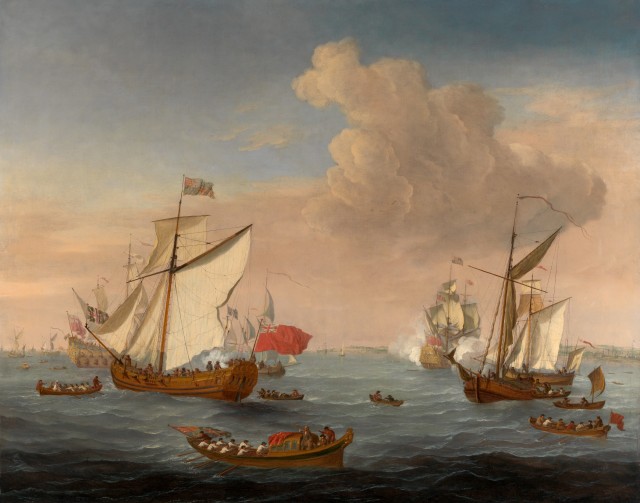Just to give an idea of the variety or lack there of, in the 18th century sailor’s diet.
Provisions listed for the British ship Bellona 74 guns in 1760
listed as provisions for 650 men for four months.
- Beef 5200 pieces 20800 lbs
- Pork 9620 pieces 19240 lbs
- Beer 236 butts 29736 US gallons
- Water 339 butts 30 puncheons 60 hogsheads 49018 US gallons
- Bread 650 bags 72800 lbs
- Butter 3900 lbs
- Cheese 14160 lbs
- Oatmeal 19008 lbs
- Peas 20800 lbs
- Flour 15590 lbs
- Suet 2600 lbs
- Vinegar 709 US gallons
Provisions reported on-board the British Sloop Alert 1777, a sloop of 60 men.
- Beef 462 pieces in 6 barrels weighing 2238 lbs
- Pork 777 pieces in 5 barrels weighing 1753 lbs
- Beer 12 barrels weighing 788 lbs
- Water 56 hogsheads and 25 casks of 18 gallons each about 4091 US gallons
- Bread 6048 lbs in 54 bags
- Butter 420 lbs
- Oatmeal 20 bushels weighing 800 lbs
- Pease 16 bushels weighing 928 lbs
- Flower 1300 lbs in 4 barrels
- Suet 82 lbs in 1 barrel
- Raisons 200 lbs in 2 barrels
- Rum 4 half hogsheads 126 US gallons
- Vinegar 1 hogshead 63 US gallons



That was just the long term stores, right? They took on fresh things like fruits, veggies and eggs if they could get them when they were in port, didn’t they? Otherwise, no wonder they needed press gangs!
Yes, but the fresh stores would not last long once they were out to sea.
The food was infested with rats and seawater mixed with the drinks, so no, it didnt last long!
I really live this stuff! I am making these into a CD, for the posterity for my family.
Thank goodness for the oatmeal. Only roughage in the diet :{
No wonder the poor devils drank.
i like pudding
Wonder how much of that was already spoiled when it was loaded? There is one of the (War of 1812) Jack Aubrey novels in which Aubrey finally outsmarted the quartermaster of provisions who intentionally sent them spoiled meat. And of course we all know that the flour was oft infested with weevils….and that we always take the “lesser of two weevils”!
Apparently it was a fairly common practice among those responsible for delivering casks of salt pork to outposts and forts to drain off the brine in order to lighten the load. Just prior to final delivery, they would refill the casks with fresh water. Um…what’s that smell?
Does anyone have any information on the H.M.S. George that carried the missionary David Livingstone to Africa on December 8, 1840?
Fresh beef and pork was issued when available which was in port and shortly after leaving. Enlisted sailors diet was essentially what is listed above, the suet and raisins used to make a pudding on special occasions. Sauerkraut was issued in the USN as an anti-scorbutic. Officers were able to stock their own mess with privately purchased food, beverages and livestock (hens for eggs, lamb, etc.) Commissary positions were in the RN were very lucrative. Money saved on inferior rations/skimming ration weights went into the commissariat’s pocket. This was one of the reasons the RN mutinied in the Nore.
Hi Jon, this is really interesting … thanks! Could you share the source of this information?
This info came from the “Anatomy of the Ship” series by Conway Maritime Press. Both ships have specific books devoted to them and the research portion is very good.
Pingback: 18th century Sailor’s food – Ships Provisions. A Link. | Prepper's Survival Homestead
Any information on what the rations and provisions would of been on the sailing warship HMS VICTORY ?
Pingback: How much Butter people Eat | Dairy Moos
Call me silly but I’m guessing the ‘raisons’ weren’t for a lovely pork roast, floured, browned in butter, sliced thin with a topping of rum and raisin reduction.
The Raisons where issues for the ships crew to eat as it was found to help prevent Scurvy. and it was easy to dry them at any time of the year. So even with the first know Green houses, Grapes could be grown year round to provide a continuous supply of them. The Ship’s stores would also contain the Juice of 1000 lemons. and if available they would also have Barrels of Apples, as they can go for a long time before spoilage would set in.
I can’t believe no potatoes!